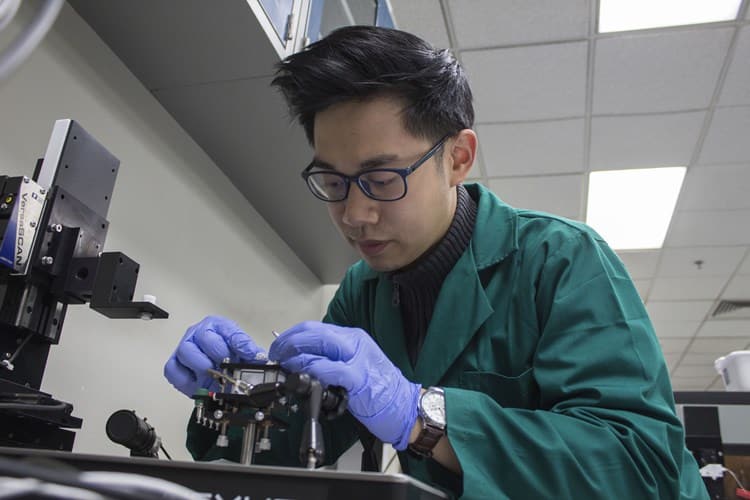
Ho Lun had the initial idea of creating a multi-function protective coating that could be used for high temperature fuel cell in aircraft engines. Learning from his previous ASP mentor (Alex Jalbuena) that Dr. Ravi is an open-minded person who recruits students based on their dedication, he decided to start sitting-in in Dr. Ravi’s weekly research meetings and eventually showcase his idea to him. In the beginning, he recommended Ho Lun to work for a senior project team, who studies the corrosion behaviors of titanium alloys for biomedical application, to learn about research. While assisting his team, he dedicated his time toward reading literature, writing a well-developed proposal and actively learning how experiments are conducted. After Spring quarter, he started an undergraduate research team to implement this idea.
Ho Lun’s current research involves characterizing the corrosion and fatigue behaviors of porous alloys for low-temperature electrolysis application, and thereby determining their optimal performance according to their structure and composition. His interests of research also extend to developing protective coatings whose geometry and properties can be controlled via nano-structuring, electroplating, and inkjet printing methods.
He describes ego as being his biggest struggle. As stated earlier, his first official research project was the development of protective coatings for high temperature fuel cells application. This project only lasted 2 months because he discovered that he made an incorrect hypothesis at the beginning of his project. After discussing with Dr. Ravi and his team about this issue, they decided to switch direction before they put too much time on a project that may undermine their reputation. This was a difficult decision to make as he confessed his mistake to his teammates and mentor. Yet, considering the future impact of ego and stubbornness, he decided to face this incidentally honestly and openly. This decision was very significant in his research journey because it not only developed his necessary work ethic as a researcher, but he also stepped out of his comfort zone to become more open to different areas of research, such as low temperature water electrolysis, which later became his current research project.
He will be presenting his research in RSCA 2018, Nace Corrosion 2018 (Phoenix, AZ) and 2018 McNair Scholar Symposium (Berkeley, CA). Ho Lun’s short-term research goal is to understand whether the geometry of materials (shapes, sizes, mass distribution etc) can influence their physical, mechanical and electrochemical properties. The scale of what he desires to accomplish is enormous, and therefore, he needs to focus on developing the necessary skills and knowledge to make such an influence. This goal also defines the scope of his research to focus on characterizing how porous alloys respond differently when they have different porous structures. He aspires to pursue a Ph.D. in materials engineering and become a college professor who can not only conduct research in his area of interest, but also make science and engineering knowledge accessible to the public. So becoming a good researcher is fundamental to his academic and career development.
“How? I know nothing!”- Undergraduates who haven’t started their research.
From his experience as an ASP peer mentor and interaction with his peers, Ho Lun has come to understand that newcomers tend to underestimate themselves and undermine their potential because they do not understand what the professor is doing. Yet, this mindset is wrong. “First of all, no one expects you to know everything before starting a research, or you don’t even need to research as you know everything already. You discover and learn simultaneously as you research. Therefore, if you are interested or even have an idea, just go and talk to the professor. Go ask the professors about their research. You are not making a commitment, simply go and know this person better. What do you got to lose? Secondly, in case you have just started to do research, keep in mind that researching is not taking a class or working for a part-time. You should not limit your research works based on hour per week, because research takes anywhere from 10 to 70 hours per week depending on your progress. You really need to spend a lot of time understanding what you are doing.”
Article courtesy of Dr. Winny Dong and Cal Poly Pomona
Please visit https://www.cpp.edu/our-cpp/about/profiles/asp-spotlight.shtml to see Ho Lun Chan’s story and other ASP Researchers.
Founded in 1978, the Council on Undergraduate Research (CUR) focuses on providing high-quality and collaborative undergraduate research, scholarly, and creative activity. Among the many activities and networking opportunities that CUR provides, the organization also offers support for the professional growth of faculty and administrators through expert-designed institutes, conferences, and a wide-range of volunteer positions. The CUR community, made up of nearly 700 institutions and 13,000 individuals, continues to provide a platform for discussion and other resources related to mentoring, connecting, and creating relationships centered around undergraduate research. CUR’s advocacy efforts are also a large portion of its work as they strive to strengthen support for undergraduate research. Its continued growth in connections with representatives, private foundations, government agencies, and campuses world-wide provides value to its members and gives voice to undergraduate research. CUR is committed to inclusivity and diversity in all of its activities and our community.
CUR focuses on giving a voice to undergraduate research with learning through doing. It provides connections to a multitude of campuses and government agencies, all while promoting networking and professional growth to its community.


